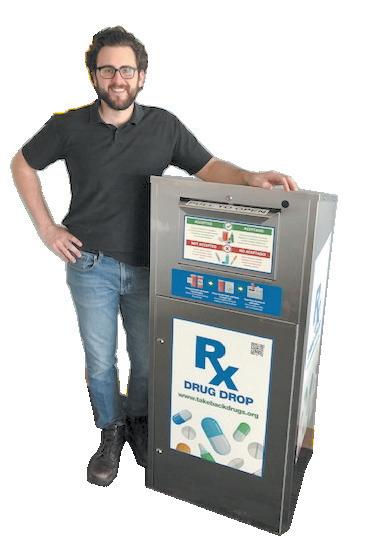
2 minute read
Interested in Hosting a Take-Back Bin
Find out what it takes
BY ANNE STOKES
Medication take-back bins keep communities safe and clean. To learn what it takes to host one, we talked to San Joaquin County Supervisor Bob Elliott and Yolo County Central Landfill Waste Reduction and Sustainability Manager Marissa Juhler.
How do medication take-back bins benefit the communities in which they’re located?
Bob Elliott: These bins will provide an easy way for the public to dispose of unused or expired opioids and other medications in a safe manner. In the long run, the bins will help to alleviate our growing opioid abuse problem by removing these drugs from an obvious and easily accessible source — our medicine cabinets.
Marissa Juhler: Environmental harm can come from residents flushing meds down toilets or sinks or improperly disposing of them in the watersheds. Take-back bins provide a convenient means for residents to do the right thing with their expired medications, protecting both their health as well as the environment.
What types of places are suitable to host a take-back bin?
Marissa Juhler: Pharmacies, hospitals with pharmacies and law enforcement locations. Host locations would be responsible for maintaining a bin, keeping it secure, educating customers about the benefits of the program and scheduling pharmaceutical pickups. Bins are also required to be located inside a building, within view of a pharmacist or law enforcement officer, and equipped with double-locking doors for security purposes.
What types of medications are accepted at the take-back bin locations?
Marissa Juhler: You can bring in prescription and over-the-counter medications. While some locations can only accept non-controlled substances, all of Yolo County’s kiosks accept both controlled and non-controlled medications because most residents cannot be expected to know which drugs are controlled and non-controlled. Due to federal and state regulations, we only see pharmacies and law enforcement offices as options where both can be accepted. However, residents cannot use bins to dispose of medical sharps and needles, vitamins and dietary supplements, aerosol containers like asthma inhalers, chemotherapy or radiopharmaceuticals, business medical waste, marijuana, or illegal controlled substances like meth or heroin.
What are the costs and requirements involved in hosting a bin?
Bob Elliott: While the current program that the county administers is expensive, CPSC placed additional bins for free in the county under the grant program. The hope is that CPSC will be able to continue the program after August of 2020, so that it may continue to be free for the med bin hosts.
Marissa Juhler: A weekly or monthly service fee (would be) incurred by the pharmacy for contracting out the collection and proper disposal of these materials. Pharmacies would be responsible for maintaining a bin, keeping it secure, educating customers about the benefits of the program, and scheduling pickups. Meds are then hauled off to an incinerator for destruction. Through CPSC’s grant program, this is all free to the med bin host through at least August 2020.
As host locations, what support can businesses receive from local and state agencies?
Bob Elliott: The host location can be promoted with other drop-off sites through the local Opioid Safety Coalition, Department of Public Works, and public health departments. CPSC will also list their location information on its online maps.
For more information on what types of pharmaceuticals can be accepted, take-back bin locations or to apply for a bin, visit www.takebackdrugs.org.




